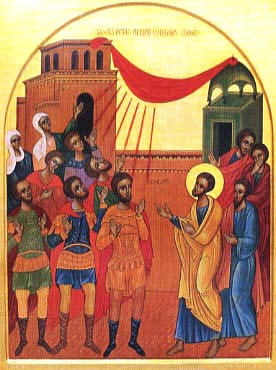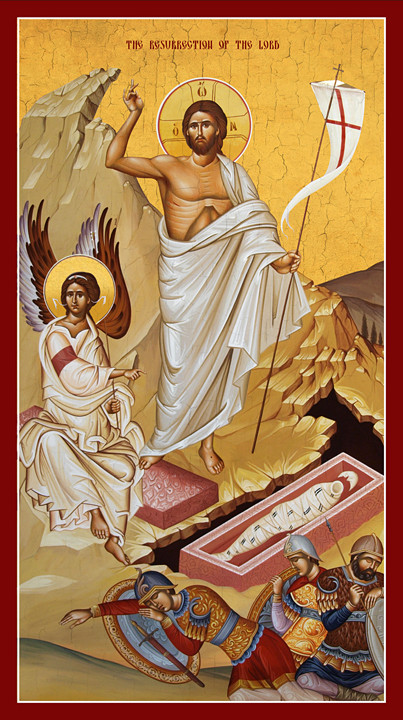 |
| Peter meets Cornelius |
Tuesday
after the First Sunday after Trinity
And
the following day they entered Caesarea. Now Cornelius was waiting for them,
and had called together his relatives and close friends. As Peter was coming
in, Cornelius met him and fell down at his feet and worshiped him. But Peter
lifted him up, saying, “Stand up; I myself am also a man.” And as he talked
with him, he went in and found many who had come together. Then he said to
them, “You know how unlawful it is for a Jewish man to keep company with or go
to one of another nation. But God has shown me that I should not call any man
common or unclean. Therefore I came without objection as soon as I was sent
for. I ask, then, for what reason have you sent for me?” So Cornelius said,
“Four days ago I was fasting until this hour; and at the ninth hour I prayed in
my house, and behold, a man stood before me in bright clothing, and said,
‘Cornelius, your prayer has been heard, and your alms are remembered in the
sight of God. Send therefore to Joppa and call Simon here, whose surname is
Peter. He is lodging in the house of Simon, a tanner, by the sea. When he
comes, he will speak to you.’ So I sent to you immediately, and you have done
well to come. Now therefore, we are all present before God, to hear all the
things commanded you by God” (Acts 10:24-33).
Peter preached to the masses at
Pentecost and 5,000 Christians were made. These were foreigners from many
different countries, but they were all there for the feast of Pentecost; they
were all Jews. Gentiles were a different story. How should they be treated?
Could they jump right into the the Way,
without first becoming a Jew? It shouldn’t be surprising that this issue came
up. The Israelites were instructed to separate themselves from the Gentiles, or
the nations, and given special laws to govern them civilly, ceremonially, and morally, to mark them as different. Paul, at one point, calls out Peter for
his hypocrisy regarding interacting with Gentiles,
For
before certain men came from James, he would eat with the Gentiles; but when
they came, he withdrew and separated himself, fearing those who were of the
circumcision.[1]
God granted a vision to both the
Apostle Peter, and to Cornelius the centurion. They were, however, different
visions. Peter’s was a direct prophetic revelation from God. God showed Peter a
bunch of unclean animals and told him, “Kill and eat.” Upon meeting Cornelius,
Peter explains that, in this vision,
“…God
has shown me that I should not call any man common or unclean.”[2]
Peter is shown by God in this vision
that God is the God of the gentiles as well as the Jews; In Christ there is not
Jew or Gentile, slave or free, male or female for in Christ Jesus we are all
one.[3]
The vision God gave to Cornelius was
different. He was basically told to talk to Peter, and Peter would tell him
what he needed to know. God used supernatural means to direct Cornelius to the
Apostle. Why? Why not just give Cornelius the Gospel through a direct
revelation? The answer is simple, if not entirely obvious: God does not wish to
deal with man except through His outward Word. Jesus promised to give special
revelation, and special spiritual gifts like tongue-speaking and healing, to
the Apostles. He said those signs would accompany them, and act as a
confirmation that the Word they proclaimed was true. He did not make such a
promise to everyone. The episode of Peter and Cornelius demonstrates to us that
God’s preferred method of converting men is through the means of the Word,
baptizing and teaching, in no particular order.
Our Lord could have easily done to
Cornelius what He did to Paul. Jesus could have appeared to Him, converted Him
in a glorious and terrible flash of light, and personally taught him all the things
he needed to know. He didn’t do that. That kind of communication was reserved
for the Apostles, like Peter and Paul. Our Lord pointed Cornelius to Peter, a
preacher of the Gospel, one of the sent-ones
whose job it was to proclaim God’s Word to all people throughout the whole
world.
We are not ashamed of the Gospel, for
it is the power of God to salvation for all who believe, for the Jew first,
then for the Gentile.[4]
And we know that faith comes from the preaching, and preaching through the Word
of Christ.[5]
Cornelius,
living among the Jews, had heard long before about the coming Messiah, through
whom he was righteous before God. In such faith, his prayers and alms were
acceptable to God (since Luke calls him God-fearing). Without the Word coming
first and without hearing it, he could not have believed or been righteous.[6]
After Peter preaches the Word to
Cornelius and his household, a miracle happens: another Pentecost. God the Holy
Spirit manifests outwardly in the speaking of tongues by those on whom He fell.
Then, baptism for the whole household: “Can anyone forbid water, that these
should not be baptized who have received the Holy Spirit just as we have?”[7] Baptism
accompanies this preaching and teaching because, the baptizing and teaching
must never be separated. They go together. They are both forms of the outward
Word.
Whether it be through the proclamation
of the Word in preaching, or the outward Word and promise of God of the
forgiveness of sins and everlasting life in Christ’s death and resurrection
joined to water, or bread and wine,
we
must firmly hold that God grants His Spirit or grace to no one except through
or with the preceding outward Word (Galatians 3:2, 5).[8]
The Word proclaimed by our faithful
pastors from the pulpit is this same efficacious, outward Word that Peter
proclaimed to Cornelius and his household. The baptism we have received, the
promise that by the death and resurrection of Christ our sins have been washed
away, and we have put on Christ, received the Holy Spirit, and eternal life, is
the same as theirs also. Just as it did then, the outward Word creates faith in
the hearts of men by the working of the Holy Spirit.
Do not despise preaching and God’s
Word, but hold it sacred, and gladly hear and learn it. It is the means through
which God works repentance and faith; it is the means through which He works to
break our hearts and bring us to repentance for our sins, and draws us to Him
through Christ, who died as the ransom for the sin of the world, and rose
again. Hear the Word, repent, and believe the Gospel. Christ has redeemed you,
a lost and condemned person, not with gold or silver, but with His holy,
precious blood, and by His innocent suffering and death. He applies this
redemption to us through the outward Word: His means of Word and Sacrament.
Bibliography
McCain, Paul T, Robert C Baker, Gene E Veith, and
Edward A Engelbrecht. Concordia, The Lutheran Confessions: A Reader's
Edition of the Book of Concord. 1st. Saint Louis: Concordia Publishing
House, 2005.
[1]
Galatians 2:11
[2]
Acts 10:28
[3]
Galatians 3:28
[4]
Romans 1:16
[5] McCain,
Paul T, Robert C Baker, Gene E Veith, and Edward A Engelbrecht, Concordia,
The Lutheran Confessions: A Reader's Edition of the Book of Concord. 1st.
Saint Louis: Concordia Publishing House, 2005. Romans 10:17, quoted from FC SD II, 51
[6] McCain,
et. al. Concordia, The Lutheran
Confessions, SA III, VIII, 8
[7]
Acts 10:47
[8] McCain,
et. al., Concordia, The Lutheran
Confessions, SA III VIII 3

